The Ceramic Legacy of Panos Valsamakis in Athens
The workshop of famed tile painter...
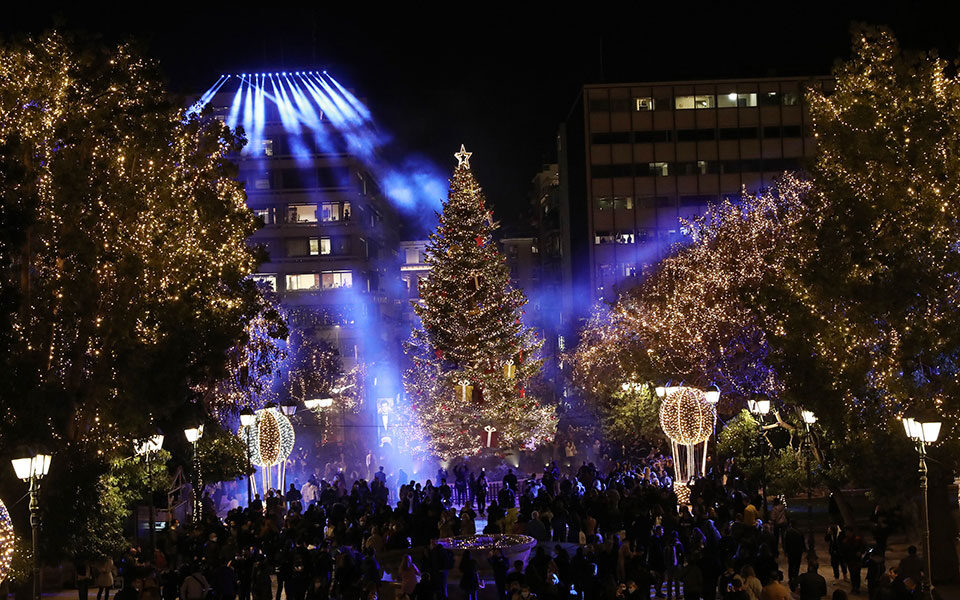
The lighting of the tree draws crowds to Syntagma Square, Athens.
© Yiannis Liakos/Intime News
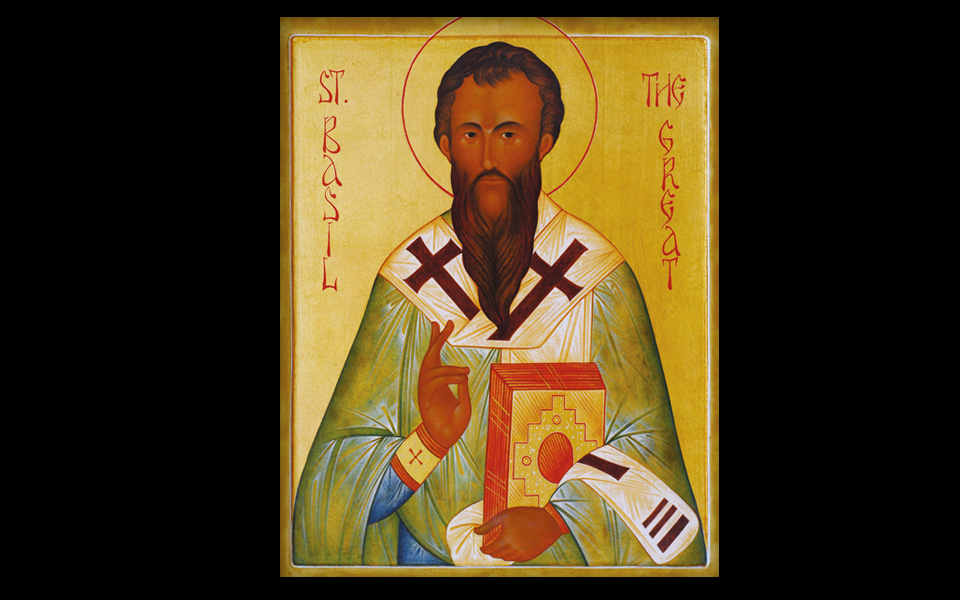
Saint Basil the Great
Walking in the Christmas markets of Greek towns, or past the elaborately decorated windows of shops large and small, one will, of course, see the familiar cheery, rotund, red-suited and hatted figure who is the universal symbol of Christmas.
Yet in Greece, technically speaking, this figure is not jolly Saint Nick, but a different saint altogether.
While today Greeks have embraced much of the modern mythology around this gift-bearing avatar (lives in the North Pole, has flying reindeer, fashions toys using elf labor, etc), in the Eastern Orthodox tradition, the saint most associated with the giving of gifts around Christmas is not Saint Nicholas, but another saint from the same century – Basil the Great, a.k.a. Basil of Caesarea. As such, the Greek for Santa Claus is “Aghios Vasilis,” meaning Saint Basil.
One of the Three Hierarchs who helped shape the Christian theology in the 4th century, St Basil was known for caring for the weak, building a hospital and hospice and dedicating his family’s inheritance to benefit the poor. His feast day is celebrated on January 1st, which brings us to the next point on our list…

Traditionally, in Greece, gift-giving happens at New Year's.
© Shutterstock
While Christmas Day is celebrated with big family dinners, sweet treats and joy, traditionally, there’s one thing that makes the day different than in most parts of the Christmas-celebrating world: there are often no gifts. Instead, presents are customarily handed out on New Year’s, in celebration of the feast day of “Greek Santa”, Aghios Vasilis.
This is also when Greeks cut the traditional New Year’s cake, called the vasilopita, which contains a coin or charm hidden in the dough–the person to find it in their slice, it is said, will be blessed with good fortune for the year (read more about the vasilopita here).
This tradition is said to be based on a tale involving Aghios Vasilis, who once found himself in possession of many valuables belonging to the citizens of Caesarea with no way of knowing what belonged to whom (tellings differ as to why they were collected). As a solution, he had them all baked into buns, and handed them out to the people.
(Still need help picking out gifts? Find a list of our best present ideas for 2021-2022 here).
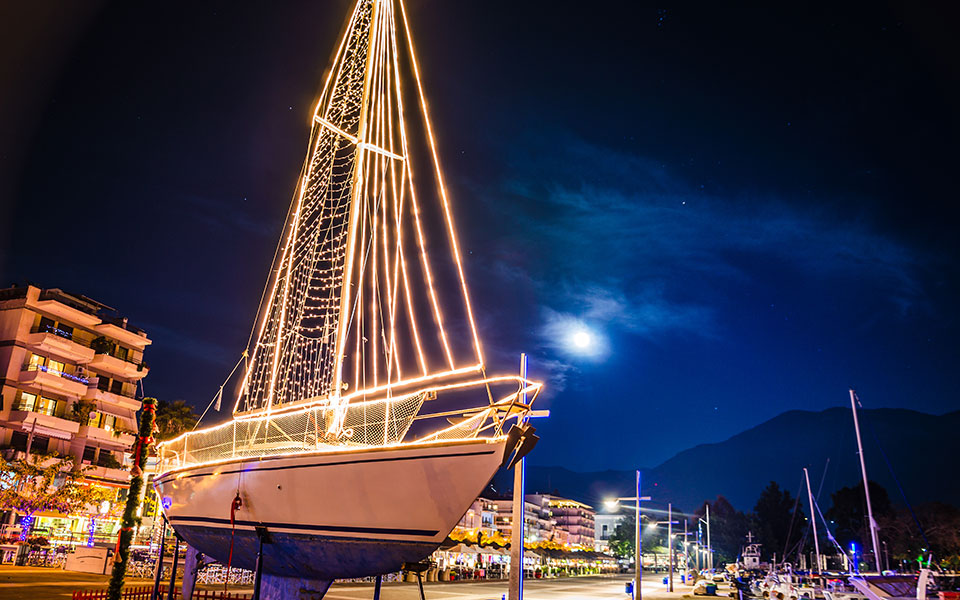
© Shutterstock
While Saint Basil is the star of the show, Saint Nicholas (whose feast day is in December) also has a place in Greek Christmas celebrations. The patron saint of sailors, he is honored during the whole of the holiday period with decorated boats, often found where you would expect to see a Christmas tree.
In the old days, the wives and children of sailors would craft decorative boats themselves during the holiday period. Today, in ports and marinas you’ll see many a life-sized vessel bedecked in lights in honor of this tradition, while small caiques are often set up in town squares (especially in seaside areas and on the islands), and fairylight-strewn model boats become the focal point in many homes.
Of course, the Christmas tree has long been warmly adopted as a symbol of the holidays in Greece just as elsewhere; still, many Greeks keep up the old tradition as well, and so you will often see boats and trees side by side.
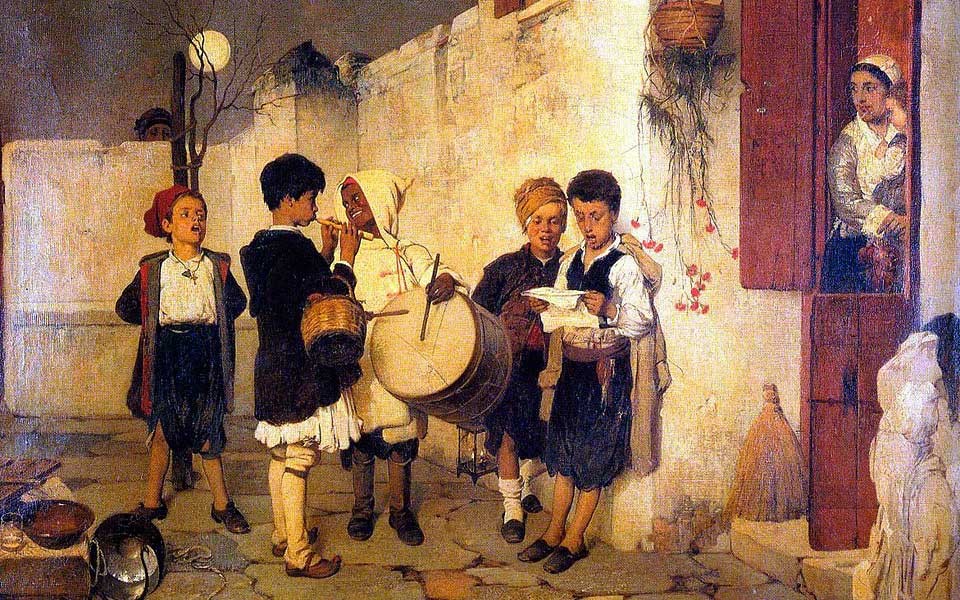
The oil in canvas painting "Carols" (1872) by Nikiforos Lytras, depicting children with different origins singing all together
© Nikiforos Lytras
Caroling is a long-standing tradition in Greece, but the carols, called kalanda, are quite different from famous melodies such as “O Holy Night” and “Rudolph the Red-Nosed Reindeer”.
Aside from the fact that they’re usually accompanied by the high-pitched ringing of the triangle, the rhythm of the songs can – to the ear of an outsider, sound a bit strange – a fact that is explained by their roots: the much different musical traditions of Byzantine and Roman times. The lyrics of the songs tell Christian stories referring to the events that took place around the birth of Christ.
The kalanda are performed mostly by young children, who are rewarded by their parents and those who choose to open their doors with some pocket change and sweets. They’re performed three times throughout the holidays: on Christmas (Eve & Day), New Year’s (Eve & Day), and Epiphany (see next point on our list).
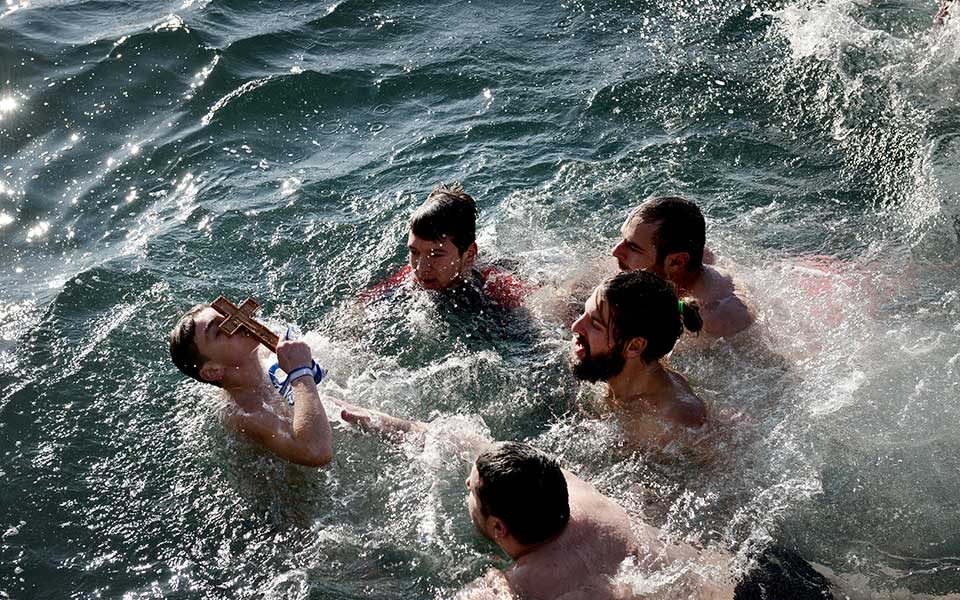
Boy kissing the cross at the Great Sanctification of Water
© Shutterstock
New Year’s marks the end of the year, but not of the holiday season. On January 6 (which is also a bank holiday), Greeks commemorate the baptism of Christ in the final celebration of the winter holidays, the Epiphany, also referred to as Theophany or Ta Fota (The Lights). It’s one of the most important days celebrated by Christians the world over, but while western denominations focus more on the visit of the three wise men to baby Jesus, followers of the Orthodox Church honor the presence of God during his baptism.
Once again, children go door to door singing the kalanda, telling the story. Naturally, the day has also come to symbolize Holy Water, which explains the other famous customs carried out on this day.
The service of the Great Sanctification of Water is held near bodies of water across the country (seas, lakes, rivers – the biggest celebration of all takes place at the port of Piraeus). Following church services, people gather by the edge of the water, which the priest blesses by casting a cross into it. Young men then dive in to retrieve it; the one who makes it through the cold water to the cross first, and returns it to the priest, is awarded with a special blessing, and often cash gifts from the crowd.
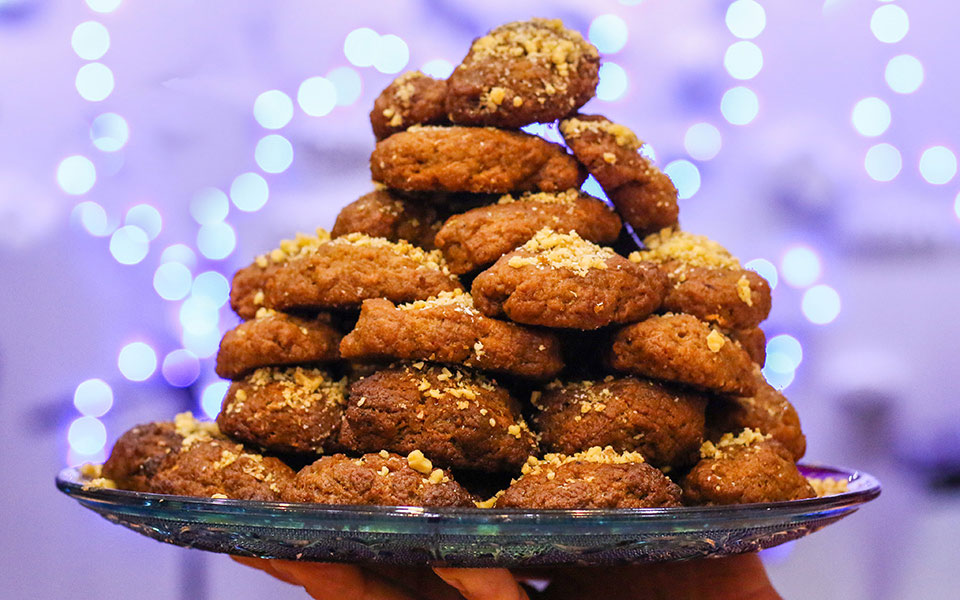
Melomakarona
© Shutterstock
Finally, like everywhere else in the world, a big holiday like Christmas obviously comes with special treats. In Greece, the food on the table varies from region to region (in Kozani, for example, it wouldn’t be Christmas without stuffed cabbage, whereas people of Thrace enjoy a special vegan baklava on Christmas Eve), but a few recipes are considered a must all over the country.
Pork is almost always served as the first meat to break the advent fast, stuffed turkey has become popular in recent years, mulled wine or raki with honey is often sipped around the holidays, and the New Year’s Vasilopita is ceremoniously cut and served in homes and workplaces everywhere.
Most obligatory however, are the two Christmas cookies, which seems to divide the population into two camps. While most people enjoy both, most everyone who grew up in Greece passionately favors one of the two. Kourabiedes are buttery shortbread-like almond cookies, made with rosewater and covered in very generous layers of powdered sugar. Melomakarona are soft and syrupy, topped with walnuts and slightly gingerbread-like in flavor, but their most important ingredient is honey.
To make up your mind about which is your favorite, we recommend sampling both as many times as you get a chance! Find recipes for melomakarona and kourabiedes here.
The workshop of famed tile painter...
Between Strefi and Lycabettus Hills, Neapoli...
Explore the timeless beauty of the...
Among the many city eateries offering...